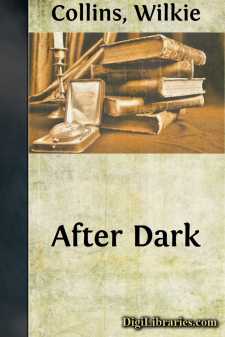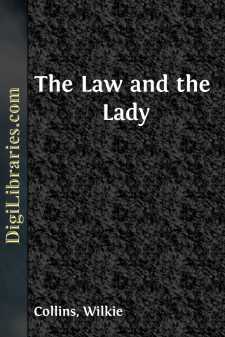Categories
- Antiques & Collectibles 13
- Architecture 36
- Art 48
- Bibles 22
- Biography & Autobiography 816
- Body, Mind & Spirit 145
- Business & Economics 28
- Children's Books 17
- Children's Fiction 14
- Computers 4
- Cooking 94
- Crafts & Hobbies 4
- Drama 346
- Education 58
- Family & Relationships 59
- Fiction 11834
- Foreign Language Study 3
- Games 19
- Gardening 17
- Health & Fitness 34
- History 1378
- House & Home 1
- Humor 147
- Juvenile Fiction 1873
- Juvenile Nonfiction 202
- Language Arts & Disciplines 89
- Law 16
- Literary Collections 686
- Literary Criticism 179
- Mathematics 13
- Medical 41
- Music 40
- Nature 179
- Non-Classifiable 1768
- Performing Arts 7
- Periodicals 1453
- Philosophy 66
- Photography 2
- Poetry 897
- Political Science 203
- Psychology 45
- Reference 154
- Religion 516
- Science 126
- Self-Help 85
- Social Science 82
- Sports & Recreation 34
- Study Aids 3
- Technology & Engineering 59
- Transportation 23
- Travel 463
- True Crime 29
Wilkie Collins
Wilkie Collins was a prominent English novelist and playwright of the Victorian era, best known for pioneering the detective fiction genre with works like "The Woman in White" (1859) and "The Moonstone" (1868). His intricate plots, memorable characters, and innovative narrative techniques significantly influenced contemporary and later literature. Collins was also a close friend of Charles Dickens, with whom he collaborated on several literary projects.
Author's Books:
Sort by:
by:
Wilkie Collins
CHAPTER I. THE GOVERNOR EXPLAINS. At the request of a person who has claims on me that I must not disown, I consent to look back through a long interval of years and to describe events which took place within the walls of an English prison during the earlier period of my appointment as Governor. Viewing my task by the light which later experience casts on it, I think I shall act wisely by exercising...
more...
by:
Wilkie Collins
OPENING CHAPTER. A CHILD'S SUNDAY. At a quarter to one o'clock, on a wet Sunday afternoon, in November 1837, Samuel Snoxell, page to Mr. Zachary Thorpe, of Baregrove Square, London, left the area gate with three umbrellas under his arm, to meet his master and mistress at the church door, on the conclusion of morning service. Snoxell had been specially directed by the housemaid to distribute...
more...
by:
Wilkie Collins
Chapter 1. The date is between twenty and thirty years ago. The place is an English sea-port. The time is night. And the business of the moment is—dancing. The Mayor and Corporation of the town are giving a grand ball, in celebration of the departure of an Arctic expedition from their port. The ships of the expedition are two in number—the Wanderer and the Sea-mew. They are to sail (in search of...
more...
by:
Wilkie Collins
CHAPTER I. "Well, Monsieur Guillaume, what is the news this evening?" "None that I know of, Monsieur Justin, except that Mademoiselle Rose is to be married to-morrow." "Much obliged, my respectable old friend, for so interesting and unexpected a reply to my question. Considering that I am the valet of Monsieur Danville, who plays the distinguished part of bridegroom in the little...
more...
by:
Wilkie Collins
CHAPTER THE FIRST You are here invited to read the story of an Event which occurred in an out-of-the-way corner of England, some years since. The persons principally concerned in the Event are:—a blind girl; two (twin) brothers; a skilled surgeon; and a curious foreign woman. I am the curious foreign woman. And I take it on myself—for reasons which will presently appear—to tell the story. So far...
more...
by:
Wilkie Collins
CHAPTER I. GREENWATER BROAD LOOK back, my memory, through the dim labyrinth of the past, through the mingling joys and sorrows of twenty years. Rise again, my boyhood's days, by the winding green shores of the little lake. Come to me once more, my child-love, in the innocent beauty of your first ten years of life. Let us live again, my angel, as we lived in our first paradise, before sin and...
more...
by:
Wilkie Collins
CHAPTER 1. The mountains forming the range of Alps which border on the north-eastern confines of Italy, were, in the autumn of the year 408, already furrowed in numerous directions by the tracks of the invading forces of those northern nations generally comprised under the appellation of Goths. In some places these tracks were denoted on either side by fallen trees, and occasionally assumed, when half...
more...
by:
Wilkie Collins
CHAPTER I. THE BRIDE'S MISTAKE. "FOR after this manner in the old time the holy women also who trusted in God adorned themselves, being in subjection unto their own husbands; even as Sarah obeyed Abraham, calling him lord; whose daughters ye are as long as ye do well, and are not afraid with any amazement." Concluding the Marriage Service of the Church of England in those well-known words,...
more...
by:
Wilkie Collins
MRS. ZANT AND THE GHOST. I. THE course of this narrative describes the return of a disembodied spirit to earth, and leads the reader on new and strange ground. Not in the obscurity of midnight, but in the searching light of day, did the supernatural influence assert itself. Neither revealed by a vision, nor announced by a voice, it reached mortal knowledge through the sense which is least easily...
more...
by:
Wilkie Collins
CHAPTER I. OLD Lady Lydiard sat meditating by the fireside, with three letters lying open on her lap. Time had discolored the paper, and had turned the ink to a brownish hue. The letters were all addressed to the same person—"THE RT. HON. LORD LYDIARD"—and were all signed in the same way—"Your affectionate cousin, James Tollmidge." Judged by these specimens of his correspondence,...
more...











